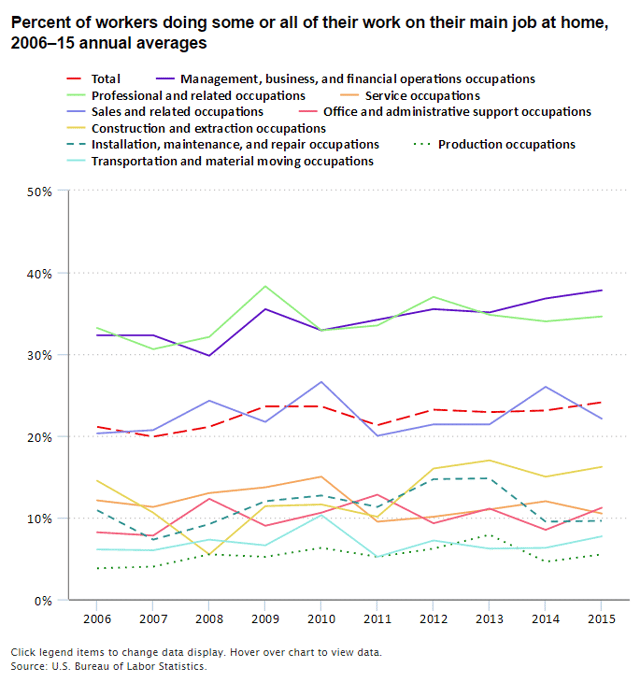The ability to work from home is a work perk that’s becoming commonplace - pioneered by start-ups without communal office spaces and made necessary as an offered benefit by millennial workforces just in the last few years. Forbes has even released a report on the Top Companies Offering Remote Jobs.
And according to The Bureau of Labor Statistics, 24% of employed people did some or all of their work at home in 2015. And that percentage is on the rise.

Among the reasons working remotely is appealing to employees?
- Little to no commute
- Flexible work days and hours
- No need for office attire
- More possibility to incorporate chores, errands or travel into your days
These examples would arguably be appealing to any level of employee, but unless you possess a specific set of personality and lifestyle traits, the freedom of flexibility doesn’t always produce a perfect work-setting.
Let’s take a closer look at the reasons why everyone isn’t working remotely.
1. Remote work requires LOTS of self-responsibility and self-motivation
Picture your work day, priorities and deadlines. Now picture attempting to execute and deliver your best solutions to them all without your manager or teammates around you. Working remotely will test your motivation, as your employer will still expect the same level of great work to be done, as if you were in a physical office.

If you find it difficult to execute goals and priorities without supervision or management within close proximity, working remotely is probably not the best setting for you.
Anthony Curlo iterates in BizJournals that employees must really know themselves before considering remote work a factor, since so many people have trouble staying self motivated and lasered-focused on their responsibilities.

2. Working in an isolated setting can put a damper on things like happiness, collaboration and creativity
If you’re currently satisfied with your job’s office-setting, you might want to stay there! Research shows that working from home can be beneficial, but in small doses. According to Fusion, people who work remotely roughly two days per week report decreased job satisfaction, due to isolation and being alone too much of the day.

Quick brainstorm meeting at Proxyclick
In addition to a decrease in overall satisfaction, you risk missing out on organic moments of team collaboration. Remote meeting softwares and wifi can take you so far while working from home, but instances of walking over to a coworker to quickly share a brainstorm or idea are invaluable.
These key elements of natural in-person collaboration are hard to replace while working remotely.
3. “Flexible” office hours can translate to “endless” office hours
The flexibility of working from home is appealing to so many, because of the fact that you can set your own hours - meaning, hours you’re online or available to work. But that in itself is also the downfall.
When you leave an office setting, that’s the most obvious physical representation that you’re done working. Alternatively, when you’re working remotely, you can’t always convey that to your coworkers, so they may be more likely to call on you for deadlines at all hours of the day, night or weekend.
It takes that much more structured work and effort on your part to make sure everyone on your team knows and understands when you’re done working remotely for the day or week.
4. Distraction is deadly
You know those things you think about as your mind drifts occasionally during the work-day? Laundry you have to do, dishes left in the sink, a prescription you have to pick up…
When you work remotely, you’re more likely to actually stop what you’re doing and take care of those things, which is a huge deterrent to productivity and focus. The line is blurred when working from home, as you’re in the same setting as the one you wake up, do chores and host a family in.
Home office is sometimes easier said than done ;-)
And these distractions can be deadly interruptions to achieving all the tasks you need to accomplish in a given work-day. Getting out of your home and into a designated work space is the only way many employees can be productive.
5. Maintaining workplace and client relationships takes more effort than ever
If you’ve established meaningful relationships with your teammates, employers and clients or customers, working remotely could threaten to interrupt the time and effort you’ve put there. It’s much harder, and sometimes impossible depending on schedules, to join for meetings, lunches and networking events when you’re working remotely, and that’s valuable face-time that can take you out of a tight-knit group.

Fusion also reports this as a hindrance to job satisfaction, noting that “employees who frequently interacted with each other reported being happier and were more likely to keep their jobs” - something that’s much more difficult to maintain while working remotely.
Much of the employer-employee workforce sees the ability to work from home work-perk with rose-colored glasses on - only focusing on the freedom and flexibility. But when that compromises your productivity, team collaboration, creativity and executing goals, is it really a perk at all?
How to make working remotely work?
It’s best to work remotely - and offer employees the ability to work remotely - when some guidelines have been established on how to work effectively from home or outside of the office in general. Everyone should have the opportunity to choose how to work because people perform better in different scenarios.

Our product designer Quentin works both remotely and in the office
It should be up to the worker themselves to decide if working remotely is the right (or wrong) choice for them. Having a mixture of people who work in-office and remotely is, ideally, the best for any modern company.